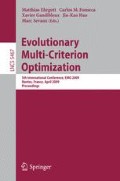Abstract
The article presents a solution approach for a curriculum-based timetabling problem, a complex planning problem found in many universities.
With regard to the true nature of the problem, we treat it as multi-objective optimization problem, trying to balance several aspects that simultaneous have to be taken into consideration. A solution framework based on local search heuristics is presented, allowing the planner to identify compromise solutions. Two different aggregation techniques are used and studied. First, a weighted sum aggregation, and second, a reference point based approach.
Experimental investigations are carried out for benchmark instances taken from track 3 of the International Timetabling Competition ITC 2007. After having been invited to the finals of the competition, held in August 2008 in Montréal, and thus ranking among the best five approaches world-wide, we here extend our work towards the use of reference points.
Access this chapter
Tax calculation will be finalised at checkout
Purchases are for personal use only
Preview
Unable to display preview. Download preview PDF.
References
Carter, M.W.: Timetabling. In: Gass, S., Harris, C. (eds.) Encyclopedia of Operations Research and Management Science, 2nd edn., pp. 833–836. Kluwer Academic Publishers, Dordrecht (2001)
Pinedo, M.: Scheduling: Theory, Algorithms, and Systems, 2nd edn. Prentice-Hall, Upper Saddle River (2002)
Landa-Silva, J.D., Burke, E.K., Petrovic, S.: An introduction to multiobjective metaheuristics for scheduling and timetabling. In: Gandibleux, X., Sevaux, M., Sörensen, K., T’kindt, V. (eds.) Metaheuristics for Multiobjective Optimisation. Lecture Notes in Economics and Mathematical Systems, vol. 535, pp. 91–129. Springer, Heidelberg (2004)
Burke, E.K., Petrovic, S.: Recent research directions in automated timetabling. European Journal of Operational Research 140(2), 266–280 (2002)
van den Broek, J., Hurkens, C., Woeginger, G.: Timetabling problems at the TU Eindhoven. European Journal of Operational Research (2008) (article in press)
Schimmelpfeng, K., Helber, S.: Application of a real-world university-course timetabling model solved by integer programming. OR Spectrum 29(4), 783–803 (2007)
Lewis, R.: A survey of metaheuristic-based techniques for university timetabling problems. OR Spectrum 30, 167–190 (2008)
Di Gaspero, L., McCollum, B., Schaerf, A.: The second international timetabling competition (ITC 2007): Curriculum-based course timetabling (track 3). Technical Report QUB/IEEE/Tech/ITC2007/CurriculumCTT/v1.0/1 (August 2007)
Joslin, D.E., Clements, D.P.: “Squeaky wheel” optimization. Journal of Artificial Intelligence Research 10, 353–373 (1999)
Lourenço, H.R., Martin, O., Stützle, T.: Iterated local search. In: Glover, F., Kochenberger, G.A. (eds.) Handbook of Metaheuristics. International Series in Operations Research & Management Science, vol. 57, pp. 321–353. Kluwer Academic Publishers, Dordrecht (2003)
Dueck, G., Scheuer, T.: Threshold accepting: A general purpose optimization algorithm appearing superior to simulated annealing. Journal of Computational Physics 90, 161–175 (1990)
Kirkpatrick, S., Gellat, C.D., Vecchi, M.P.: Optimization by simulated annealing. Science 220(4598), 671–680 (1983)
Burke, E.K., Bykov, Y., Newall, J.P., Petrovic, S.: A time-predefined approach to course timetabling. Yugoslav Journal of Operations Research (YUJOR) 13(2), 139–151 (2003)
Landa-Silva, D., Obit, J.H.: Great deluge with non-linear decay rate for solving course timetabling problems. In: Proceedings of the 2008 IEEE Conference on Intelligent Systems (IS 2008), pp. 8.11–8.18. IEEE Press, Los Alamitos (2008)
Geiger, M.J.: An application of the threshold accepting metaheuristic for curriculum based course timetabling. In: Proceedings of the 7th International Conference on the Practice and Theory of Automated Timetabling, Montréal, Canada (August 2008)
Wolpert, D.H., Macready, W.G.: No free lunch theorems for optimization. IEEE Transactions on Evolutionary Computation 1, 67–82 (1997)
Petrovic, S., Bykov, Y.: A multiobjective optimisation technique for exam timetabling based on trajectories. In: Burke, E.K., De Causmaecker, P. (eds.) PATAT 2002. LNCS, vol. 2740, pp. 149–166. Springer, Heidelberg (2003)
Wierzbicki, A.P.: The Use of Reference Objectives in Multiobjective Optimization. In: Fandel, G., Gal, T. (eds.) Multiple Criteria Decision Making Theory and Application, pp. 469–486. Springer, Heidelberg (1980)
Author information
Authors and Affiliations
Editor information
Editors and Affiliations
Rights and permissions
Copyright information
© 2009 Springer-Verlag Berlin Heidelberg
About this paper
Cite this paper
Geiger, M.J. (2009). Multi-criteria Curriculum-Based Course Timetabling—A Comparison of a Weighted Sum and a Reference Point Based Approach. In: Ehrgott, M., Fonseca, C.M., Gandibleux, X., Hao, JK., Sevaux, M. (eds) Evolutionary Multi-Criterion Optimization. EMO 2009. Lecture Notes in Computer Science, vol 5467. Springer, Berlin, Heidelberg. https://doi.org/10.1007/978-3-642-01020-0_25
Download citation
DOI: https://doi.org/10.1007/978-3-642-01020-0_25
Publisher Name: Springer, Berlin, Heidelberg
Print ISBN: 978-3-642-01019-4
Online ISBN: 978-3-642-01020-0
eBook Packages: Computer ScienceComputer Science (R0)

